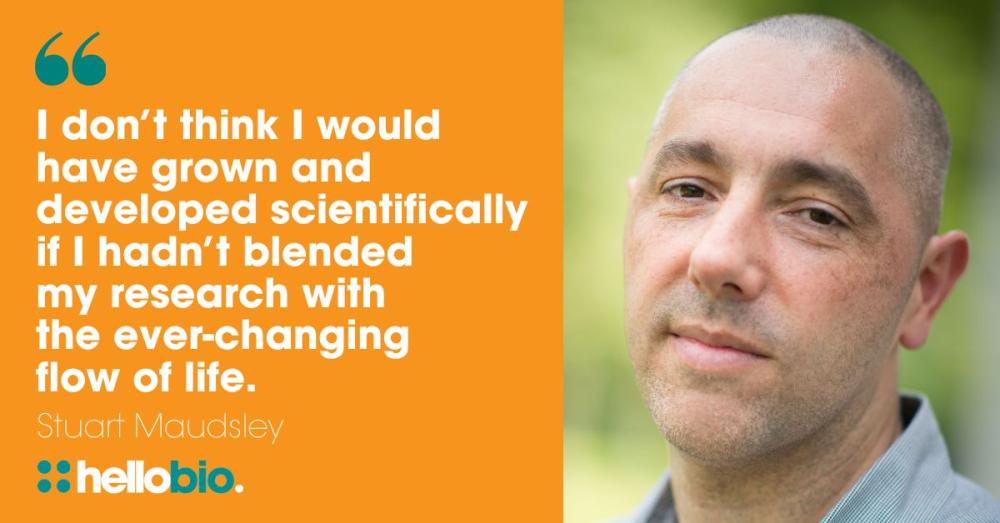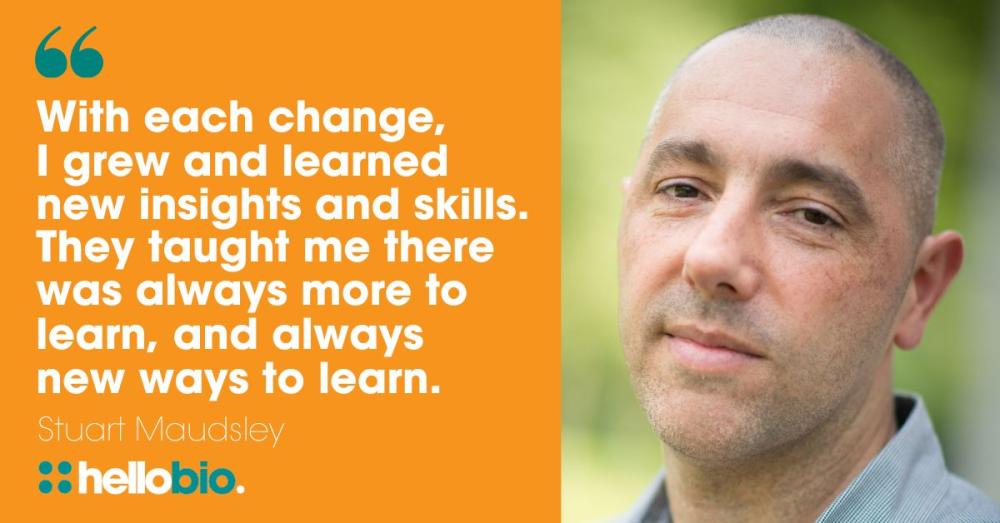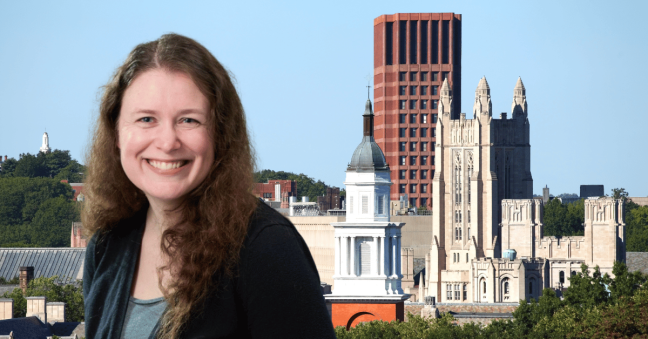The Travelling Scientist Problem: Lessons from a Life in Motion
For life scientists today, there are many possible career paths. Some researchers stay rooted in one place, while others embrace change to pursue a more global journey.
Professor Stuart Maudsley of the Moffitt Cancer Center and Research Institute, USA, has spent over 35 years exploring the frontiers of molecular pharmacology, travelling the world, collaborating with countless talented scientists, and working in labs across different countries. Through all the moves and changes, his enduring focus on G protein-coupled receptors (GPCRs) has remained constant.
In this guest blog, he shares how a career built on curiosity, courage, and exploration can foster both personal growth and scientific discovery.
Changing labs, constant focus
I guess I would describe myself as a scientist – specifically, a molecular pharmacologist who started out as an undergraduate working on G protein-coupled receptors (GPCRs) and now, 35 years later, still works on GPCRs. However, that’s where the consistency of my path stops. In between there have been many places, many people, a family, start-ups, grants, papers, posters, presentations, awards, ups, downs, etc., etc., etc. So, while there may have been a core interest in my research career - GPCRs - what I’ve worked on, who I’ve worked with, and where I’ve worked has been an ongoing journey. While some people like to stay with the familiar, I’ve chosen to take a different path in both my scientific career and my life – which, of course, are closely intertwined. If you’ve ever read one of my articles or listened to one of my podcasts, you’ll know that I live/talk/speak largely through fun sayings and interesting cliches, so here’s one that fits the bill, from the pen of an author from my alma mater – ‘not all who wander are lost’.
When writing this passage (in between yet more grants, and papers of course…), I first wrote, ‘I don’t know where my interest in travel came from,’ but then I realized... yes, I do. As a young boy, I was captivated by fantasies of intergalactic adventure – the first movie I saw was Star Wars in 1977. Growing up in Britain, my childhood was also full of the adventures of the Doctor and his companions. To me, this was the ultimate dream - travelling anywhere, anytime! Well, I was never offered a place in the TARDIS, so I had to go to university instead and study pharmacology – a little different but as it’s turned out, almost as interesting!
Find yourself a wormhole
While the study of pharmacotherapeutics and how they can biohack the human condition is a source of endless fascination in itself, it wouldn’t have been half as interesting, exciting, or mind-expanding if I hadn’t combined it with the further discoveries of different places, cultures, people, workplaces, architecture, weather, and of course, challenges. I don’t think I would have grown and developed scientifically if I hadn’t blended my research with the ever-changing flow of life.
I used to have discussions with my students at the NIH, and I would often tell them, ‘If you’re not moving forward, you’re actually moving backwards’. Yes, it’s obvious, but many young students and investigators don’t take into account the constant global shift of research and science – it’s like a tectonic plate, always moving slowly but inexorably. So, the rest of the field is always advancing in a seemingly effortless manner. Against this background, you’ll only start to feel that you’re moving forward if you can outpace the tectonic plate of research.
I would advise my students and trainees – who were, and still are, a huge source of pride to me – to try and play a totally different game. Don’t try to out-walk the plate, don’t try to out-run it…. find yourself a wormhole (an Einstein-Rosen bridge, of course), work out how to traverse it, and arrive where the tectonic plate will be in 10 to 20 years. Yes, it sounds difficult, but it’s a great way to do science.
A career in constant migration
In my career I’ve traversed many wormholes, and these critical portals in science have often come through making audacious leaps into the unknown. The ‘unknown’ here of course is not in the dimensions of space, but in our own world – a different university, a different city, a different country, a different hemisphere, a different branch of science, a different workplace. The change of situation, position, or research field for me was the drive that kept me interested in finding those further new wormholes. So, while I’ve worked in many different places with so many super-talented people who I’ve been fortunate to learn from, I’ve been able to keep a logical flow to my research.
Research without borders
I started out as an undergraduate (in the UK) working on the electrophysiological effects of new analgesic therapeutics acting upon tachykinin receptors. I was so interested in these I continued my PhD by investigating how the structure of these receptors allowed them to respond to different drug molecules (still in the UK). During this, I worked out that measuring how the responses of these tachykinin receptors diminish after stimulation could actually be seen as the transition to a different form of signaling.
This work led me to pursue this interesting molecule (β-arrestin) and how its association with receptors could allow GPCRs to bridge to other signaling molecules, such as receptor tyrosine kinases like the EGFR (now over in the USA).
This bridge was, in part, constructed by the interaction of another tyrosine kinase (c-Src) with the receptor, which led me to then work on how gonadotropin-releasing hormones could control this signaling cascade and prevent the growth of cancer cells that don’t seem to obey the normal lifespan of cells (back to the UK again).
My growing interest in the aging process of cells took me to work on how GPCRs are involved in this process at both the cellular and whole-body levels (back to the USA again). One of the receptors we were working on that was crucial in this process - the GLP-1 receptor - has gone on to change the world of obesity. I helped to show it was a potent regulator of neurodegenerative conditions like Alzheimer’s disease.
This led me to investigate how the aging process also intersects with many other diseases, and to search for a master regulator of this process, which turned out to be a signaling adaptor for a special GPCR that appeared to be a vital regulator of aging- and stress-related DNA damage (now over to Belgium).
This ability to control the extent of DNA damage in cells led me to my current base – cancer research – where I’m now moving into my next receptor-related field (back over again to the USA).
Be ready to adapt and evolve
The research journey above took place over 25 years and included many transatlantic exchanges, cultural changes, new languages, different diseases, radically changing technical platforms, and many changes of research levels - from student to director, founder, and chair. I don’t think I’ve done anything exceptional; many others in research have done far more. Even with all this seemingly chaotic change, there is still the thought, ‘plus ça change, plus c'est la même chose’ - ‘the more things change, the more they stay the same’.
So while there were seismic shifts in location, culture, and scientific field, there was also the constant link of research and growth, which I have tried to highlight. Without those disruptions to my equilibria, I don’t think I would have grown or learned as much. This is not going to be true for everyone (see the excellent Hello Bio article from Dr. Rachel Perry from Yale), but it’s what has kept my interest and helped fuel my desire for innovation since the days of my undergraduate research up to now.
Life is an adventure
Every time I changed (jumping through those wormholes), I grew and learned new insights and skills. Each change taught me there was always more to learn, and always new ways to learn. Your life is an adventure; your research is part of that adventure, and I have chosen to have as many adventures as possible. If you want to experience a universe of learning, then just find yourself a wormhole, join me, and jump in – it will take you where you need to go.
About the author
Stuart Maudsley is the Director of the Receptor Biology Lab in the Department of Drug Discovery at the Moffitt Cancer Center and Research Institute, Tampa, Florida, USA. His research lab focusses on the development of G protein-coupled receptor (GPCR)-based therapeutic strategies for multiple aging-related disorders, including metabolic, neurodegenerative and cancer-related conditions.
He was previously the Odysseus Chair of Receptor Pharmacology and head of the Receptor Biology Lab at the University of Antwerp. Stuart is also Co-Founder of HeptOME - a start-up focused upon delivering the next generation of G protein-coupled receptor (GPCR) based therapeutics.
Read more articles by Stuart on the Hello Bio blog:
Connect with Stuart:
X: @StuartMaudsley | LinkedIn: Stuart Maudsley | ResearchGate: Stuart Maudsley | Instagram: @receptorbiologylab
Affordable GPCR Ligands & Pharmacology Products From Hello Bio
Researchers can save up to 50% on GPCR and pharmacology research products from Hello Bio – they are up to half the price of other suppliers and have been reviewed and cited by researchers worldwide.
★ Browse our pharmacology range ★
More advice on STEM career paths
If you’d like to read more about STEM career paths and inspirational science journeys, take a look at these articles on the Hello Bio blog:
-
Rooted in Research: How to Build a Successful Science Career Without Moving Institutions - guest blog by Dr Rachel Perry
-
STEM Career Paths for Life Scientists - guest blog by Dr Joanne Kamens
-
Academic vs. Non-Academic Science Careers (and choosing the right path)
-
Career Spotlights: Lecturer in Neuroscience - interview with Fabien Naneix
-
Career Spotlights: Commissioning Editor - interview with Alka Rao
-
Career Spotlights: Scientific Project Manager - interview with Agnese Solari
Join 1000s of Scientists
Be the first to hear about new product launches, free trials, special offers, and technical tips — straight to your inbox.
Subscribe to the NewsletterHigh Quality – Low Prices
By manufacturing in-house and keeping things simple, we offer savings of up to 50% compared to traditional suppliers — without compromising on quality.


















